
SENIOR SCHOOL STUDENT HANDBOOK
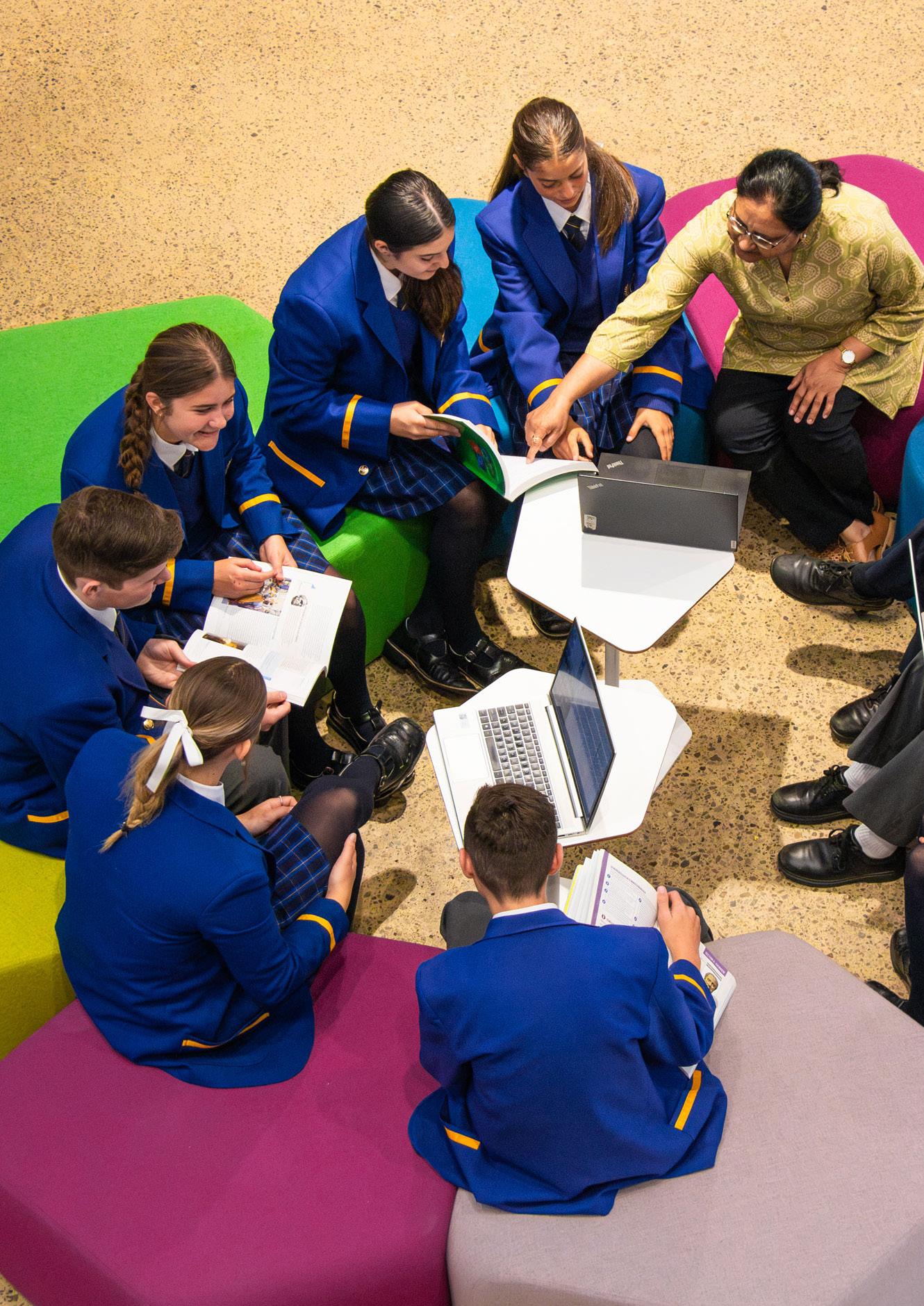



SENIOR SCHOOL STUDENT HANDBOOK


St Michael’s College believes that the unique needs of students in Years 10-12 are best met in a Senior School setting. This setting provides a student-centred program and acknowledges that students in early adolescence undergo significant phsyiological and social changes.
The primary goal of the Senior School is to address the eduational, developmental, and social needs that arise during this transitional period. In line with this philosophy, our Senior School offers:
• A positive environment that fosters respect, self-esteem, selfdiscipline, and student responsibility.
• Close contact and communication between parents and the school.
• Intervention and acceleration when needs are identified.
• An advisory and counselling program.
• Knowledgeable educators committed to junior secondary methodology.
• A quality Pastoral Care Program.
Every Pastoral classroom at St Michael’s will feature a wall chart outlining the key student responsibilities that support each child.
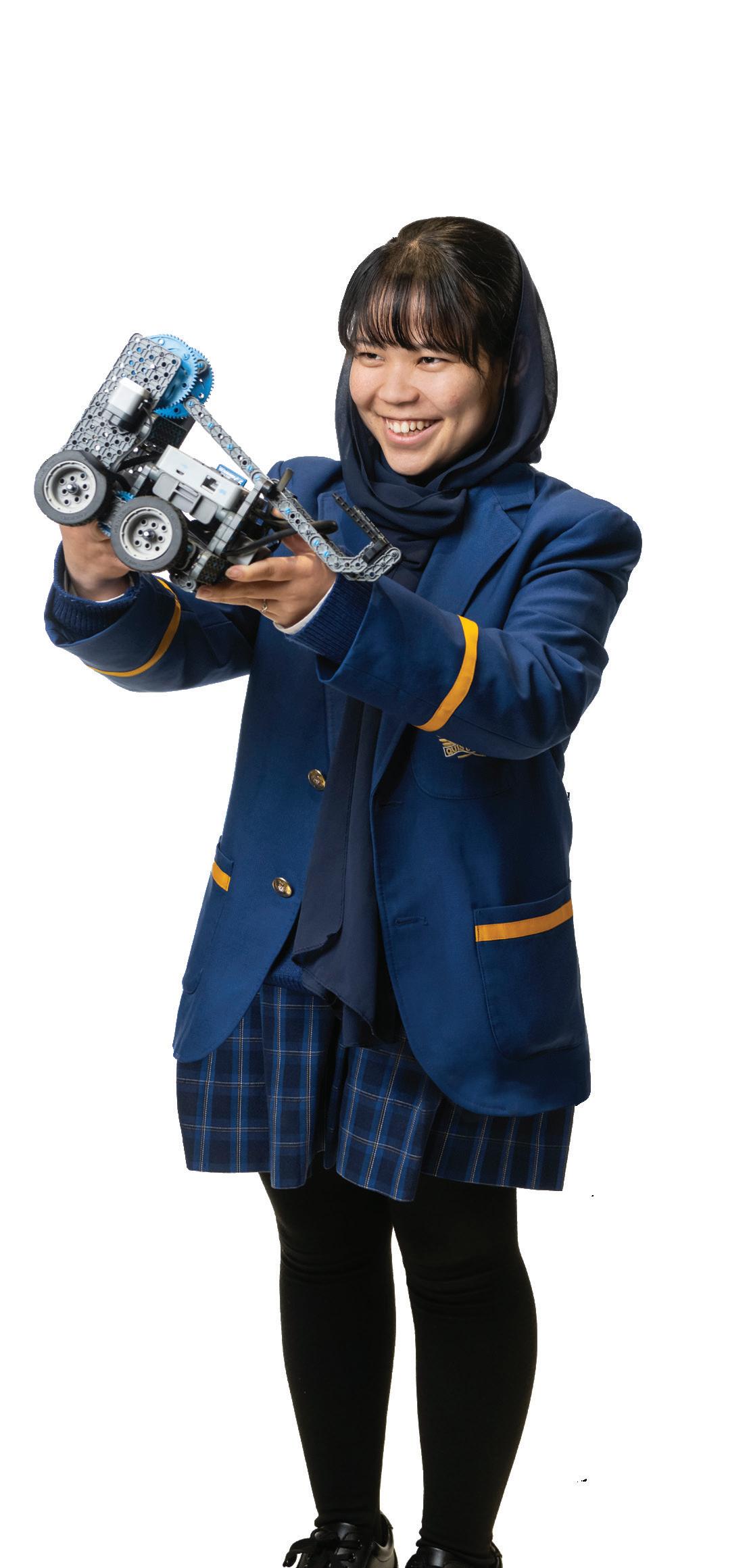






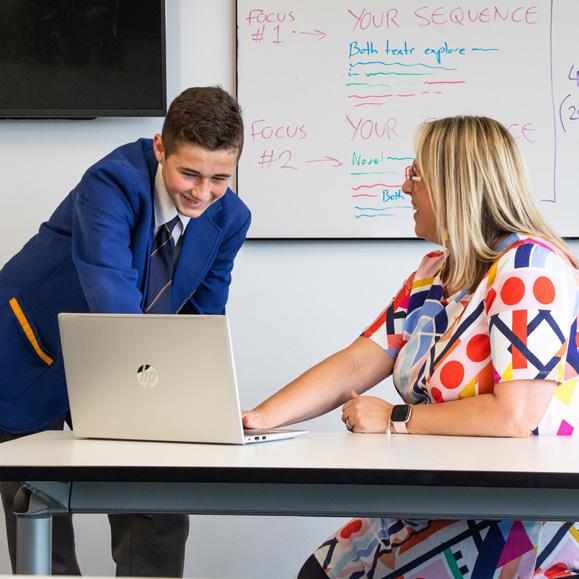
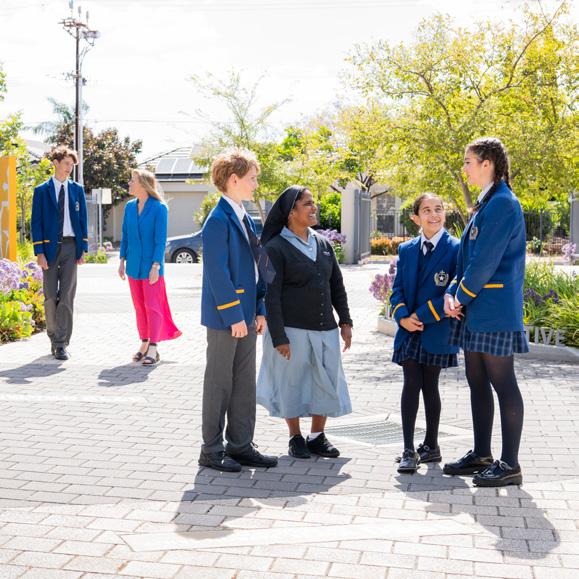

Pastoral Care is from 8:45 am to 9:00 am each day. There are also extended lessons on Wednesdays from 8:45 am – 9:40 am to incorporate Masses, Assemblies and Year Level specific activities. All students are expected to participate in these activities, as they form an important part of our community life.
Pastoral Care lessons usually focus on holistic student development and nurture wellbeing, strengths and positive relationships so that students can develop reason, the good judgement to act fairly, and contribute to their own flourishing and that of others.
More specifically, through Pastoral Care we:
1. Provide an environment in which every student is valued, feels safe and has someone to talk to.
2. Respect the dignity of each person.
3. Develop a spirit of community through positive relationships between staff, students and parents.
4. Develop self-discipline and responsibility.
5. Provide opportunities for spiritual growth.
6. Educate students in a Christ-centred model of leadership.
7. Encourage participation in social justice initiatives.
8. Provide activities and strategies that develop students’ personal, organisational and lifestyle skills and choices.
9. Provide assistance with regard to subject selection, vocational and career options.
10. Foster participation in community building and recreational activities.
Please visit the 2025 Secondary Campus Information for Families webpage for current information on the following topics:


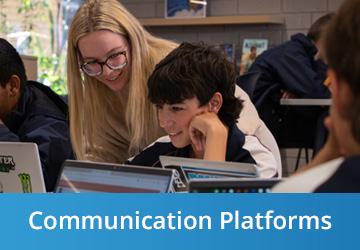

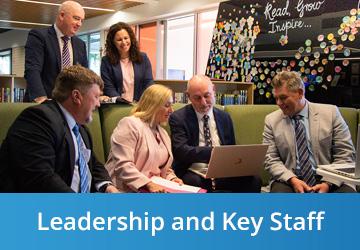
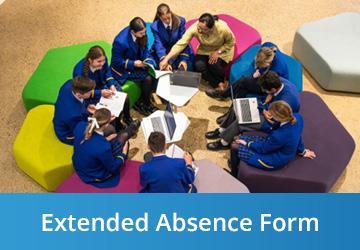
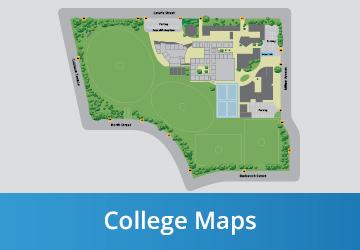
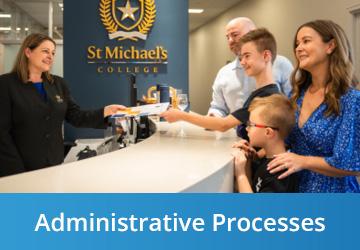
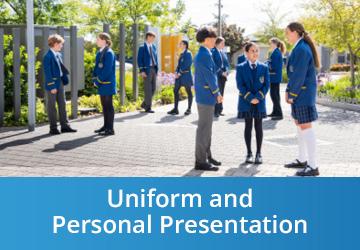

Purpose
To help students and teachers to manage workloads, and school-set deadlines for assessment tasks.
Scope
This policy applies to all teachers and students and requires parental support.
The latest time or date by which an assessment task is to be completed and submitted to the teacher.
Policy Position
For assessment tasks that are completed over an extended period of time, a number of dates are generally set at various stages of the development of the assessment task (CHECKPOINTS).
Procedure
In these cases there is an expectation that:
• The students will provide evidence of their learning to their teacher or follow a procedure outlined by their teacher;
• The teacher will monitor the progress of the student during this period.
Extensions
There are occasions when an extension of an assessment deadline can be approved for a valid reason. Acceptable grounds for the extension are determined by the teacher.
• Students are expected to negotiate the extension with the Subject Teacher before the deadline and submit a completed “Request for Extension Form”.
• Teachers are expected to follow the Work Completion Session Process when work is not presented according to school-set deadlines and where there is not a valid reason - as outlined above.
In terms of special provisions, the school makes its decisions with reference to the SACE Special Provisions in Curriculum and Assessment Policy.
Non-completion of Summative Assessment Tasks by the deadline and without negotiated extension.
Non-completion of Summative Assessment Tasks by the deadline and without negotiated extension.
The students must:
• stay for the duration of Academic Detention - one hour (3:30 pm - 4:30 pm)
• attend Academic Detention regardless of work being finished prior to the detention time
At the Academic Detention, students will have ONE HOUR to
• COMPLETE the assessment task
• SUBMIT the task ELECTRONICALLY to the subject teacher for marking
• PRINT a copy of the completed task and submit to the supervising teacher - ensuring task has name of student and name of subject teacher
Non-attendance at the Academic Detention will result in a zero and contact with parents/caregivers.
Teachers aim to ensure that an excessive number of assessment items do not fall due on the same date. Generally, they also aim to return marked material within a week.
Should concerns arise regarding these or any other areas of assessment please pass them on to your Pastoral Teacher or Year Level Director.
Plagiarism in any form is a violation of the College’s fundamental principles. This may be defined as the ‘appropriation of another’s ideas or works, in order to pass them off as one’s own’.
Examples of this practice may include:
• copying of any sources that are not acknowledged in the work;
• excessive use of, and failure to cite, printed texts such as articles and books;
• unfair use of, and reliance upon, other students’ work.
In summary, it may be regarded as an action which is intended to deceive a teacher that the work being presented and assessed is the student’s own, when in fact it is not. Of particular concern to the St Michael’s College community is cheating. It deludes the school and staff who attempt to assess the effectiveness of teaching and learning; it discriminates against other students who work honestly for their rewards and may in competitive situations miss out on opportunities because of another’s dishonesty; it misinforms the parents who operate on the assumption that the report they receive is an accurate representation of honest effort; and it erroneously grades the student who does not learn to be proud of genuine effort and whose character and learning development are stunted.
The full policy can be found on the College website and should be read by all students and parents.
Generative Artificial Intelligence (GAI) is an emerging technology that can generate content across multiple modes, presenting both opportunities and challenges in education.
Key Principles:
• Learning Enhancement: GAI tools are to support and enhance learning, not replace fundamental educational processes.
• Academic Integrity: Students must maintain honesty and trust, acknowledging sources using traditional or AI-based research methods.
• Assessment Flexibility: Teachers will specify GAI usage expectations for different tasks.
Responsible GAI Usage:
• Classroom Use: GAI should support quality teaching and learning, not distract from core skills and knowledge.
• Privacy Protection: No personal or sensitive information should be entered into GAI applications.
• Ethical Considerations: GAI must not be used if it:
- harms the wellbeing of any member of the school community
- diminishes or interferes with quality educational outcomes
- brings the College or its members’ reputation into disrepute
The full policy emphasises that while GAI is a powerful tool, it should enhance—not replace—the human element of learning and achievement.
Home study is a term implying schoolwork done at home. This may involve:
• Set work and/or reading;
• Research assignments and projects;
• Revision and study;
• A combination of all three.
It is hard to establish a required time each night; however, research suggests that there is a high correlation between the volume of time given to study and completion of work and the true realisation of innate potential.
Home study tasks emphasise skill reinforcement and development, and nurture time management and organisational skills. Time spent on home study is also effective in developing skills as an independent learner, outside of the formal school setting.
SEQTA can be accessed electronically at any time to check on homework commitments, resources and results.
Reports are issued electronically twice a year, at the end of each semester, and parents should download a copy for their records.
Outside of the reporting cycle, parents may receive a College notification in the form of a Progress Report, or Pastoral Comment which can be issued at any time. The purpose of these advices is to inform of commendable achievements, or of other matters requiring attention.
If parents are concerned about any aspect of their child’s education, they are encouraged to contact staff as soon as possible to discuss their concerns. Email may be the easiest manner as a first option, due to class commitments.
Virtues are learned over a period of time, as the result of practice and education. Students are guided towards developing healthy behaviours so that they are:
• AWARE that we create our own future as a consequence of our actions;
• RESPECTFUL of others and their property;
• STUDIOUS and WELL ORGANISED;
• CARING of others and school resources;
• HONEST;
• PUNCTUAL;
• WELL PRESENTED;
• SELF DISCIPLINED;
• POSITIVE and INVOLVED;
• COURTEOUS;
• SAFETY CONSCIOUS;
• MINDFUL to enhance the College reputation;
• Be the Best THEY can be!
Being fit, healthy and active benefits each child socially, emotionally and intellectually. Research has shown that young people who do regular physical activity have:
• Improved emotional wellbeing, mental health, selfesteem and self-concept; they feel more confident, happy, and relaxed.
• Improved health and a feeling of physical wellbeing.
• Better concentration skills and the ability to manage anxiety and stress.
• Increased capacity for learning and productivityactive children are generally more motivated and better organised than children who are inactive. Physical activity has direct links to improved learning outcomes.
• Enhanced social skills, such as cooperation and teamwork, as well as meeting new people and developing friendships.
• A more positive school outlook - active children are generally less aggressive and experience fewer discipline problems.
All students will take part in a wide range of physical activities at school and learn more about positive body image and self-esteem in their Health and Physical Education classes.
Devoting adequate time for organisation is one of the major keys to success. Being organised takes time, so it is essential that students place a high priority on preparing for each day the night before at home. Avoid the morning rush as this causes things to be forgotten, over-looked or misplaced.
Using time effectively is an important skill for secondary school students. Time management can be applied to study and lifestyle activities such as exercise, sporting activities and even getting the most out of leisure time. Encouraging good time-management habits now lays the foundation for good habits later in life.
Basic time management for each child includes:
• Utilising SEQTA to check requirements before going home to ensure all necessary items are taken home for homework completion.
• Develop focused study habits away from distractions, including those of the device kind.
• Drawing up a simple study timetable to record key dates, study requirements, deadlines for assignments, etc.
• Setting a priority against each task to help achieve goals, rather than being overwhelmed by leaving things to the last minute.
• Using a “to do” checklist.
• Celebrating the accomplishment of completion to deadline.
An appropriate home work space is the ideal. Depending on the student, it may be advantageous for them to be in a public space in the home which is not the centre of too many distractions. Students should set aside a consistent time to study in the evening, in a quiet space if possible, and allow themselves time within the planned timetable for their preferred pastimes.
Regularly viewed TV programs, club activities and sport should all be part of the timetable. The careful monitoring of devices during home study time is advisable.
Most students are responsible and exercise good judgement and this enables them to cope with the pressures of school and makes learning an enjoyable and fulfilling experience.
When the St Michael’s Student Responsibilities are not being met, actions are taken to guide students on improved choices and better judgement. Where considered appropriate, subject teachers issuing a detention do so by notifying the student’s primary carer(s). The Year Level Director may issue a Detention which signifies a serious or repeated breach of the College’s student code of conduct. Detentions can be scheduled for Wednesdays and Thursdays from 3:30 pm to 4:15 pm and will be notified to parents/ caregivers electronically in advance.
Students are required to be ready to start Pastoral Care by 8:45 am. School bags must be stored in lockers and secured with a school approved padlock. From time to time lockers may be checked for student safety. For student health reasons, back packs are NOT to be carried during the day. Small PE bags may be used to carry books and PE uniforms. These procedures are in place to comply with Occupational Health and Safety laws and provide for the safety and comfort of all students.
Large amounts of money and/or valuables should not be brought to school, as teaching staff will not assume responsibility for such items. Compliance to this policy is monitored on occasion and parents will be notified of any instances where students are not complying with correct use and resultant consequences. Please note that students are not permitted to use their mobile to contact parents unless given permission by a staff member. Parents are also asked not to contact students via devices during school hours. In cases of emergency or where necessary, parents are asked to ring the College Administration (8356 5966).
Be aware that students are responsible for items such as USB’s and Graphic Calculators. These items should at all times be in their possession. They are not to be left unattended. It is recommended that all possessions, uniform included, are clearly labelled with full name.
Recreational items, which can provide a distraction to students’ learning, should be left at home. If present at school, such items will be retained by the teacher and returned upon parent/caregiver/teacher negotiation.
Appropriate sports equipment for play during recess and lunch breaks is permitted and encouraged. The College issues equipment on loan to students during these times.
St Michael’s College is committed to ensuring the provision of a safe and caring community to which all students bring a sense of commitment and belonging. Positive relationships are at the core of the Lasallian ethos, and as such, are an important part of the Pastoral Care Program.
All parents want their child to be happy and flourish and to be reassured that their child is not going to be bullied, harassed or intimidated at school. They also don’t want their child to create such situations for others. It is an issue that St Michael’s College always takes seriously.
Bullying occurs when someone acts aggressively towards another person to gain power over them on a repeated basis. It is a deliberate attempt to make the other person feel uncomfortable or unhappy. It can happen verbally, via SMS or email, through physical abuse or social harm.
In addition to the focus on positive behaviours, St Michael’s has an anti-bullying policy, which includes key strategies for managing bullying, harassment and intimidation
An excellent start to positive behaviours at school include:
• Following the school’s dress code.
• Arriving at school and lessons on time.
• Being respectful towards teachers and other students.
• Showing reverence and respect for the learning tone and environment in all classes.
• Engaging in learning using time well
• Demonstrating a willingness to learn from challenges and considering learning experiences as opportunities for growth.
• Respect is acknowledging that someone or something has value.
• All members of the College Community are to be respectful of others and the resources available to them.
• The College does not accept any form of bullying and harassment. This includes bullying of a physical, verbal, psychological, social, sexual or cyber nature.
Students travelling to and from school by public transport are expected to behave in a positive, courteous and socially acceptable manner, for example: appropriate dress, being seated, talking quietly and complying with the expectations of transport authorities. Any complaints received from transport authorities will be communicated to parents as they are managed by the College.
The College does not have an “early dismissal” policy for hot weather. Teachers will modify lessons appropriately in consideration of “extreme” weather conditions; particularly lessons such as PE. All rooms within the College are air conditioned. After-school sports training is automatically cancelled if the forecast temperature is 36C in the preceding day’s Advertiser.
If students feel unwell at school, they must report to the First Aid Room in the Administration Office. Students must not contact parents during school to pick them up. In emergency situations, students may request to make a phone call from the Year Level Director’s office.
Students undertaking VET subjects will be absent from school on average for one day per week. They are to ensure they know the work they have missed.
Please note: If students cannot attend their VET course, they must notify that institution as well as the College.
In accordance with the College’s vision to develop a community of spiritual, academic, cultural and physical vitality, special community days highlighting a sense of connectedness and meaning are organised during the year.
These include such occasions as Sports Day, MAD (Mission Action Day), De La Salle Day (Founder’s Day) and the Year Level Retreat and Activity Days. These days are COMPULSORY school attendance days that have been planned and budgeted for in anticipation that all students participate. They are intended to play a significant role in the building of connection and community; important to our wellbeing. We thank parents in anticipation for their support of these days by ensuring that all students attend.
Students who, for genuine illness or other reasons, are unable to attend on these days, are required to provide a written explanation from their parent/caregiver to the Year Level Director via the Pastoral Teacher.
Student Services
It would not be unusual for some difficulties to arise throughout the year.
Do not be afraid to seek help if needed.
Your Pastoral Teacher, Student Counsellors, Year Level Director and Assistant Director are available to assist. The Deputies and the Principal also act to assist these people, so you have many options open to you.
The best way to deal with a problem is to deal with it early. Don’t hold back - seek help so we can work together to solve the problem.
The following departments under the umbrella of ‘Students Services’ are part of St Michael’s College academic and personal support for all students. All students and parents are invited to access these services when required. Student Services may be contacted by phone or in person.
• Personal Counselling
Available for all students who are experiencing any one of a variety of difficulties ranging from school based issues to family and relationship issues. Coming to a new school can be quite daunting for some students so we encourage students to visit the counsellors if they are at all concerned about anything. Early intervention for any difficulties, which students might be experiencing, offer the best opportunity for a positive outcome.
• Grief Counselling
Our Chaplain, Sister Nithya works in an Outreach capacity supporting students and their families who are dealing with grief through serious illness or the death of a loved one.
• Learning Support
Supports students with diagnosed learning disabilities or difficulties. The Learning Support Coordinator sets priorities for Learning Support.
• English as an Additional Language (EAL) Is part of our mainstream curriculum and assists students whose first language is not English with intensive English language support.
• St Michael’s Outreach Education Program is committed to:
Supporting a number of students from war torn countries through the mainstream English as a Second Language (EAL) program.
• Careers and Academic Counselling Students are assisted with their subject choices and career pathways to best position them for their future direction, whether it be tertiary study, an apprenticeship, or into full-time employment?
• Vocational Education and Training (VET) Assists students who are not going into university but are looking for other career pathways such as traineeships.
• Time Management and Organisation / Student Empowerment
Short term courses run for students whose ability to flourish will be supported by these programs. Please do not hesitate to contact us and come and speak with us if you have any concerns at all.
St Michael’s College has a subscription to SchoolTV, that can be accessed through the parent portal on SEQTA.
SchoolTV is a wellbeing resource that can support parents in the challenges relating to modern-day parenting. Each topic is accompanied by fact sheets, podcasts, books, articles, apps and special reports.
This award-winning resource helps build relationships, foster connections, enable understanding and break down barriers to navigate a pathway towards better mental health and wellbeing for young people. SchoolTV can help to support you by providing credible information from trusted sources with practical strategies to help alleviate some of the challenges young people face today.
The Information Communications Technology (ICT) facilities at St Michael’s College are provided exclusively for educational purposes. This policy has been established to ensure all students are given an equal opportunity to develop information literacy skills in an educational setting.
All College computers, devices and on-line resources will be used in relation to the College Curriculum and in accordance with the philosophy and standards of St Michael’s College.
The Integrated Learning Technology Program (ILTP) will be issued at the commencement of Year 7 for a 3-year life cycle. The device can be used at home as well as at school; however, the College reserves the right to capture, store and review all internet browsing and emails across our school network at any time.
In the event of inappropriate use of the ICT facilities, the College could:
• Inform parents that their child has breached the ICT Policy
• Deny access for a period of time or terminate access to any of the ICT Services
• Issue other consequences in line with normal St Michael’s behavioural processes.
It is the responsibility of the student to ensure that the ICT facilities are used for educational purposes only.
More information regarding the College’s Integrated Learning Technology Program can be found on the College home page under ‘College/Parent Information’.
It is important for students to keep a backup file of their work. Technology can fail, be lost or stolen, so it is extremely important that all students take action to ensure they have backed up their schoolwork.
Microsoft 365 (M365) is a Microsoft (MS) product that all staff and students have access to at St Michael’s College. It combines a number of different Microsoft products together and allows you to access them and all your files through your own MS ‘cloud’ account. Students are required to back up their work continually and O365 allows this to occur seamlessly. Files are backed up automatically if saved in OneDrive and can be accessed from any internet enabled computer (e.g. desktop, tablet, laptop).
Please do not contact your child directly.
Mobile Phones and other electronic devices are not to be used during the College day.
If students do bring these, it is entirely at their own risk. The mobile phone must be switched off and stored securely throughout the day.
Mobile phones should be stored safely, but they may not be switched on or used during school hours. Students who are found using their phone may have it confiscated and returned via a Year Level Director.
Other consequences may apply in line with normal St Michael’s behavioural processes.
2025 will be a year of significant growth and change in the life of all Year 10 students as they begin the journey of senior education.
This Handbook contains essential and helpful information, which will assist all families to get to know and appreciate the spirit of our community embedded in our Vision Statement.
Whilst this is a significant change of direction for all students, what will not change is that St Michael’s will continue to serve the needs of the parents and students of the western suburbs of Adelaide by providing a quality, comprehensive, and accessible Catholic Education - which it has done since 1954.
We very much look forward to working in partnership with families to assist all students to develop and grow to “be the best they can be”.
Please contact the College should you require any clarification of the information contained in this Handbook.
Mr Aldo Calo Year 10 Director
Mr Tom Simpson Year 10 Assistant Year Level Director


For information on Pastoral Teachers and important dates please visit the Year 10 SEQTA portal using the following links:
Students: learn.seqta.smc.sa.edu.au
Parents: engage.seqta.smc.sa.edu.au
The South Australian Certificate of Education (SACE) is an internationally recognised senior secondary qualification administered by the SACE Board of South Australia. It is awarded to students who complete their secondary education, and is normally completed over 3 years (Personal Learning Plan in Year 10, Stage 1 in Year 11, and Stage 2 in Year 12). All students at St Michael’s aspire to achieve the SACE, as it is a requirement for entrance to University in South Australia, interstate and overseas, many TAFE courses, and other training programs. Furthermore, a number of employees regard SACE achievement as an indicator of a student’s ability to communicate well and to take initiative in life, study and work.
Structure of the SACE:
Each subject or course successfully completed earns ‘credits’ towards the SACE; a minimum of 200 credits are required for students to gain the certificate.
• 10 credits = one semester of study = generally 60 hours of study
• 20 credits = full year of study = generally 120 hours of study
Students will receive a grade from A to E for each of their SACE subjects at Stage 1.
Students will receive a grade from A+ to E- for each of their SACE subjects at Stage 2.
To achieve the SACE, students must complete the following minimum requirements with a C grade or higher at Stage 1 and a C- or higher at Stage 2:
• Exploring Identities and Futures (EIF) 10 credits Stage 1 undertaken in Year 10
• Literacy 20 credits from a range of English subjects Stage 1
• Numeracy 10 credits from a range of mathematics Stage 1
• Research Project 10 credits - an in-depth major project Stage 2
• Other Stage 2 subjects 60 credits or more Stage 2
The remaining 90 credits can be gained through additional Stage 1 or Stage 2 subjects or Boardrecognised courses of a student’s choice, including VET and recognition of community based learning.
At St Michael’s College students will study more than the minimum 200 credits required to achieve the SACE.
Course Description
Exploring Identities and Futures will allow students to develop a pathway to thrive by exploring who they are and who they want to be. The subject supports students to learn more about themselves, their place in the world, and enables them to explore and deepen their sense of belonging, identity and connections to the world around them.
Course Content
Stage 1 Exploring Identities and Futures represents a shift away from viewing the student in isolation, with an increased focus on exploring and building connection with their peers, culture, community and work.
The subject is foundational in initiating and preparing students to and for their SACE journey and the knowledge, skills and capabilities required to be lifelong learners.
Assessment
• Assessment Type 1: Exploring me and who I want to be (60%)
• Assessment Type 2: Putting my capabilities into action (40%)
This is a significant time of transition as you enter the final years of your schooling journey.
With this comes the responsibility to complete Years 11 and 12 to earn your SACE certificate. Your achievements this year will lay the foundation for your Year 12 studies and life beyond school.
Many of you will start part-time work and obtain your driver’s licence this year. As you begin to feel more independent as young adults, it’s crucial to balance your study habits with your sporting and social commitments.
We hope you have chosen subjects that interest you. This choice brings responsibility, as teachers expect a high level of commitment to your studies.
You are required to meet deadlines and complete all assessment tasks on time.
We encourage you to approach the challenges of the year ahead with maturity and positivity. The effort you put into your Year 11 subjects will be key to your success at the end of the year. This goal is achievable for every student. Embrace the challenge and strive to reach your full potential and ability to “be the best you can be.”
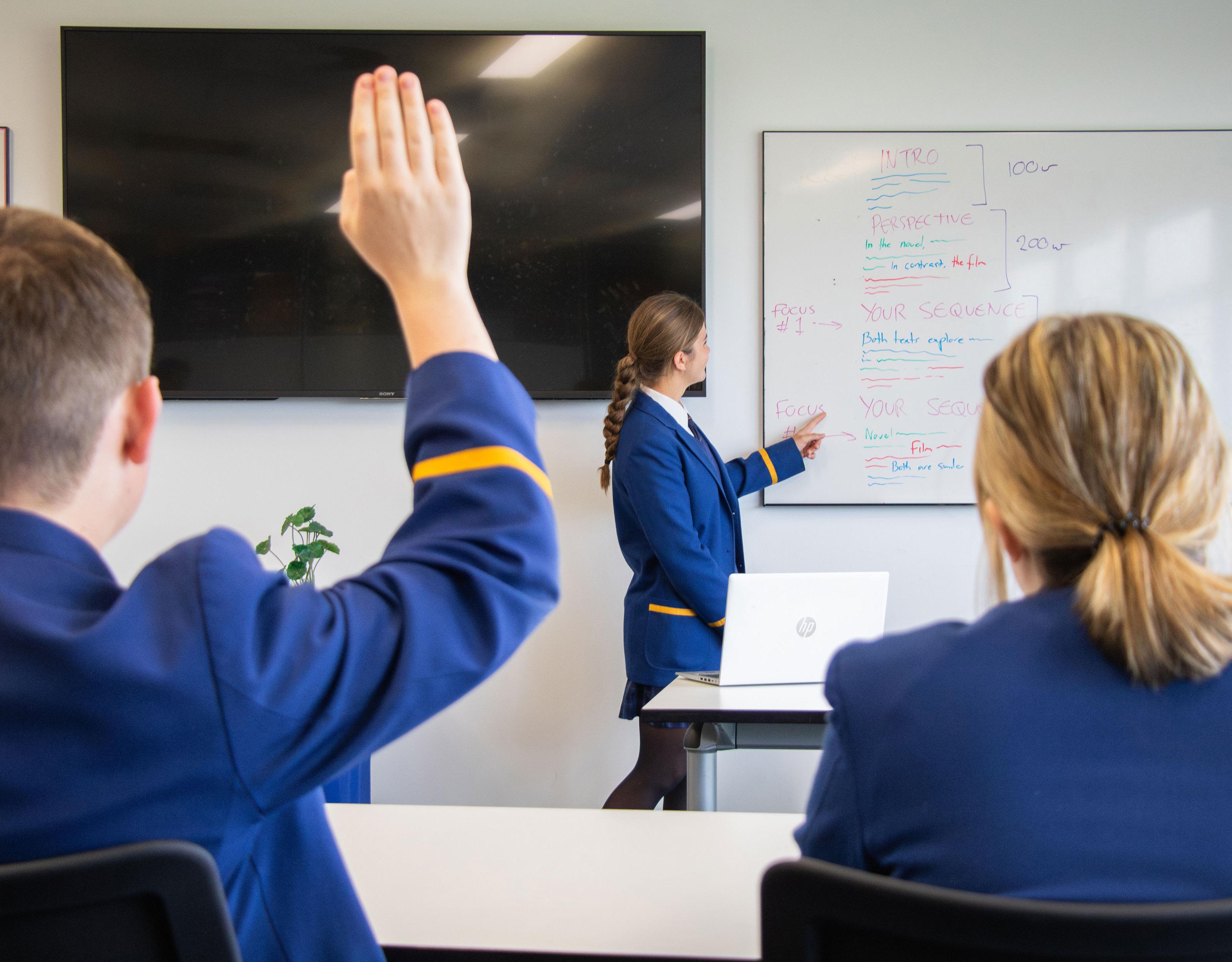
Mrs Jo Howat Year 11 Director
Mr Dominic Ascoli Year 11 Assistant Year Level Director

For information on Pastoral Teachers and important dates please visit the Year 11 SEQTA portal using the following links:
Students: learn.seqta.smc.sa.edu.au
Parents: engage.seqta.smc.sa.edu.au
Please note that there is no parking available on school grounds for students. If parking on the roadway, please be aware of the needs of residents and respect their privacy and act courteously at all time. There are also council restrictions in some areas.
You must have permission to drive to school. Please complete the Permission Form available on the Year 11 Portal. Similarly, you need permission to be driven by another student. If you are travelling to school in a vehicle driven by another student, the appropriate form must also be completed.
The SACE is an internationally recognised credential awarded to students who successfully complete Stage 1 and Stage 2 (usually Years 11 and 12).
The aim of the SACE is to enable more young people to gain the skills and values they need to achieve their best in the future.
The Senior Secondary Assessment Board of South Australia provides information concerning SACE online:
SACE information on the website: www.sace.sa.edu.au
Any student who wishes to change a subject must see Mr Gavin O’Reilly, Director of Curriculum and Assessment.
This must be done early in the Semester as changes later than two weeks disadvantage the student and the class.
At the beginning of each semester, an assessment plan for each subject will be published in the SEQTA Learning Portal which will cover the entirety of the assessment period. The assessment plan will include the approximate date of assessment tasks together with the weighting applied to that task. This plan helps you monitor the work to be completed. Marks for assessment tasks will also be released in SEQTA for students and parents
Where drafts are specified for assignments and essays, they must be submitted to the teacher for approval by the due date. Even when drafts are not formally required, they should be standard procedure and retained should verification of your work be required. Drafting is recommended as one means of ensuring optimal results.
Work must be submitted electronically through SEQTA along with any other teacher requirements, e.g. directly to the teacher concerned.
A general principle to remember is that the onus to substantiate work, or submission of work, lies with the student!
Congratulations on stepping into what promises to be your most challenging, rewarding and assuredly memorable year of schooling.
The College staff wish you every success for the ten months ahead and hope that this booklet will provide valuable insights and relevant information regarding the specific nature of Year 12 studies. Year 12 represents the culmination of your schooling journey and provides pathways for your future. Whether your individual interests and talents guide you towards employment or tertiary study, we hope that your final year will not only be fulfilling, but also provide the platform for future success.
Please explore the contents of this booklet and enter Year 12 with the full knowledge of what your final year entails. Only with this mindset and by understanding the dynamics of this crucial year can you hope to flourish and reach your potential. Wishing you all the very best for 2025!

Mr Mark Labrosciano Year 12 Director
Ms Elli Nicola Year 12 Assistant Year Level Director

For information on Pastoral Teachers and important dates please visit the Year 12 SEQTA portal using the following links:
Students: learn.seqta.smc.sa.edu.au
Parents: engage.seqta.smc.sa.edu.au
Year 12 students are at the apex of the College. They provide the seniority by virtue of time spent in the secondary school, and they become the exemplar for student standards and behaviour. Put simply, you are the role models of the student population.
This is not a position which is to be taken lightly…
Just as any group of elite and respected individuals in any walk of life are examples, for those who follow them; the Year 12 cohort of the College should provide direction and guidance to the student body. All Year 12 students have a responsibility in this regard.
This example extends to all facets of College life, such as uniform, grooming, attendance, punctuality, support of College events, etc.
Important also is your input on student matters. Constructive feedback can lead to positive developments so you are encouraged to communicate ideas to your Pastoral Teachers and College Leaders.
In any social organisation, there are those who take on the formal mantle of leadership. To the College Captain, Vice Captains and College Leaders, our thanks are extended in advance for the role you will play throughout the year as you help to add an important chapter to the ongoing tradition of leadership in the College.
You are now an important contributor to the fine SMC Year 12 tradition. Make the most of this privilege and continue the outstanding contribution which can be made to your, and the College’s, reputation.
By working, playing, studying, praying and laughing together, we can achieve a great deal!
It is the expectation of the College that all students will be involved in a co-curricular activity. This is your last opportunity to do so! Whether it is swimming, netball, debating, tennis, cricket, soccer, basketball, football, chess, drama or other activities offered, it is in your best interest to represent the College.
There are likely to be many times throughout the year when you might feel stressed and the best way to manage this is to try to stay healthy. This includes giving attention to your diet and exercise, the amount of rest/sleep you have, making time just for yourself as well as time with friends and family. It is also important to understand the impact that social networking can have on your time and state of mind. Be careful in finding a balance in all of these areas of your life as they are all important in helping you to stay healthy.
If you are concerned about any of these elements then talk to the Year 12 Director, pastoral or subject teachers, the school counsellors or help lines such as:
• Youth Health Line (Second Story) 1300 131 719
• Kids Help Line 1800 551 800
• Beyond Blue 1300 22 4636
• Lifeline 13 11 14
• Crisis Care (After Hours service only) 131611
• Sexual Health Line 1300 883 793
• Alcohol and Drug Information Service 1300 131 340
• Headspace 1800 650 890
• Reach Out.Com – http://au.reachout.com
You are also encouraged to use the “Year 12 Wall Planner”, which will be given out in Pastoral Care, as a means of long term planning and improved organisation.
It is suggested that you enter all due dates and key events so you and your family are able to plan your academic progress and expectations into the future. It is also suggested that the planner be visible in your bedroom or study, accessible to you on a daily basis.
Please make note of the following compulsory Religious Education commitments:
Seminar Day 1 10 February
Year 12 Retreat 12, 13, 14 March
Seminar Day 2 3 June
Seminar Day 3 7 August
In only the rarest and most serious circumstances will students be excused from these events which set the tone and are the cornerstone of your graduation year.
It is imperative that any student who wishes to change a subject in the weeks ahead does so through the established procedure, involving a Subject Change Form obtained from the Director of Curriculum & Assessment.
Students who move into a subject without the proper authorisation may not only default on the SACE pattern, but may fail to be registered on subject enrolment data at the SACE Board.
Impromptu or ill-considered subject changes may equally present problems for entry into particular courses and careers later in the year.
You MUST discuss the subject change as per the process outlined on the form. If you are unsure, please discuss the process with the Director of Curriculum & Assessment (Mr Gavin O’Reilly), Mr Labrosciano, a Careers Counsellor or your classroom teacher.
Once the Subject Change form is signed by a Parent and relevant Head of Department, it should be returned to Student Services for final verification and issue of a new timetable.
Consideration will only be given to subject changes which take place within the first TWO (2) weeks of Term I. If problems arise after this time, please consult your Pastoral Teacher, the Director of Curriculum & Assessment or Mr Labrosciano.
A Permission to Drive form has been sent in a permission link from Mr Labrosciano. This form MUST be completed even if you drove to school the previous year. If you are unsure about any matter related to the use of vehicles, whether you can have passengers etc, please check beforehand, rather than after the event.
Due to the number of student drivers and cyclists who use this area, due vigilance and caution must be displayed. When entering and departing, be mindful of other people / vehicles / bicycles in the vicinity. Standard rules regarding responsible use of a motor vehicle apply and inappropriate driving will lead to the loss of the privilege.
Be very careful when parking/driving around the school. We take complaints made by neighbours very seriously, whether it be rubbish left, noise made, parking incorrectly or driving dangerously.
Year 12 students are required to be at school by 8:40 am each day (unless their timetable states otherwise, e.g. study (see below). All absences must be accounted for and parents/caregivers are expected to phone through absences by 9:30 am if possible. If prolonged absence seems likely, then Mr Labrosciano needs to be contacted and required work will be gathered, and left at the front office for collection.
For students who have an extended absence from school either due to holidays or other events, please refer to the College’s Extended Absence from School Policy. While teachers try to adjust assessment tasks the onus remains with the student to negotiate the work missed with their individual teacher.
Prolonged absences due to illness should be accompanied by a doctor’s certificate and the Year Level Director contacted so work required can be forwarded. The doctor’s certificate allows for assessment changes as required by the SACE Board.
If you are late to school, scan your ID Card through the Front Office and provide a written explanation from a parent/caregiver.
Students are not permitted to leave the school grounds without signed permission from their parent/guardian, Pastoral Teacher and Year Level Director.
You must scan your ID card through the Administration Centre any time that you are leaving school early.
Any failure to use the system correctly will affect our responsibilities of Duty of Care and your parents/ guardians will be contacted regarding your absence.
There will be clear consequences regarding lateness; as teachers we need every minute of every lesson in Year 12 so as to be able to teach you as well as we can, so we expect students to be on time.
If students feel unwell at school, they must report to the First Aid Room in the Administration Office. Students must not contact parents during school to pick them up. In emergency situations, students may request to make a phone call from the Year Level Director’s Office.
Year 12 students will finish school at lunchtime on Monday and Friday.
Home Study is a generic term implying work done at home. This may involve:
• set work;
• assignment and projects;
• revision and study or, a combination of all three.
The more challenging aspect of home study at Year 12 is the volume and complexity of work that needs to be completed and revised. The latter is particularly important, given the on-going and cumulative nature of the assessment process in Year 12.
Week nights 3 - 3½ hours
Weekends 6 - 8 hours
That is, a total amount of 20 - 24 hours per week. This represents 4 - 5 hours per subject per week. While one may question the validity of these figures, research over recent years has suggested a high correlation between the volume of time specified above, and, true realisation of ability, especially at Year 12 level.
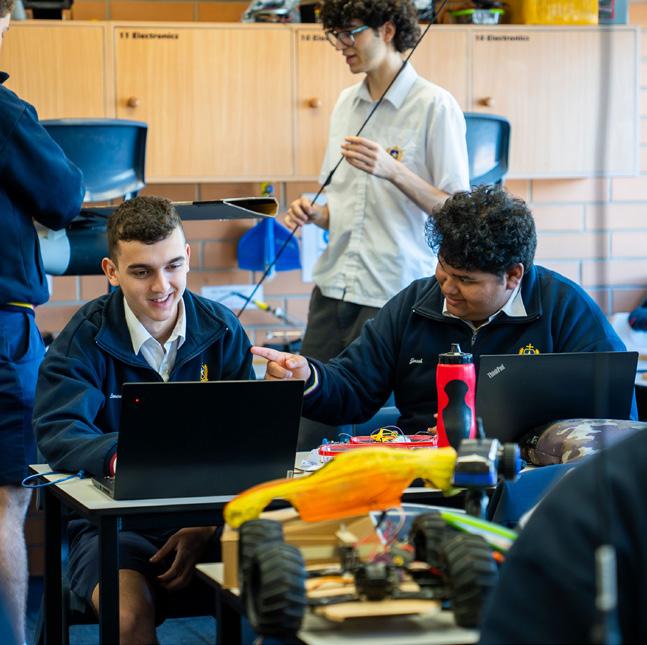
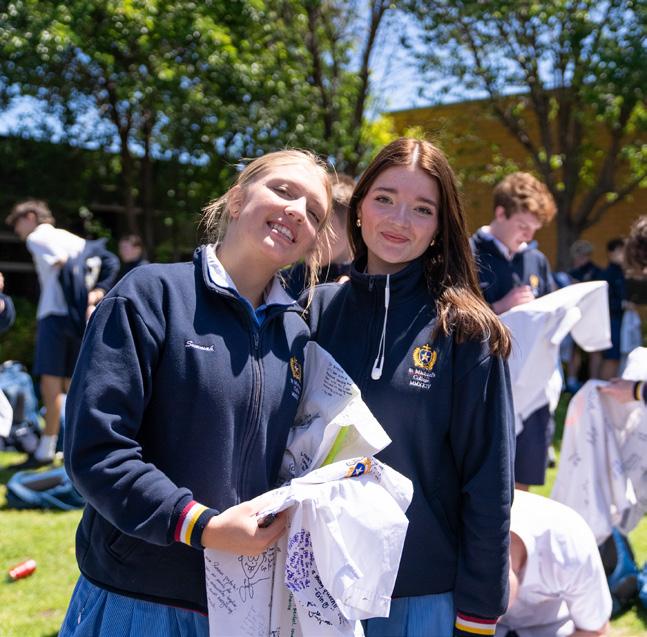
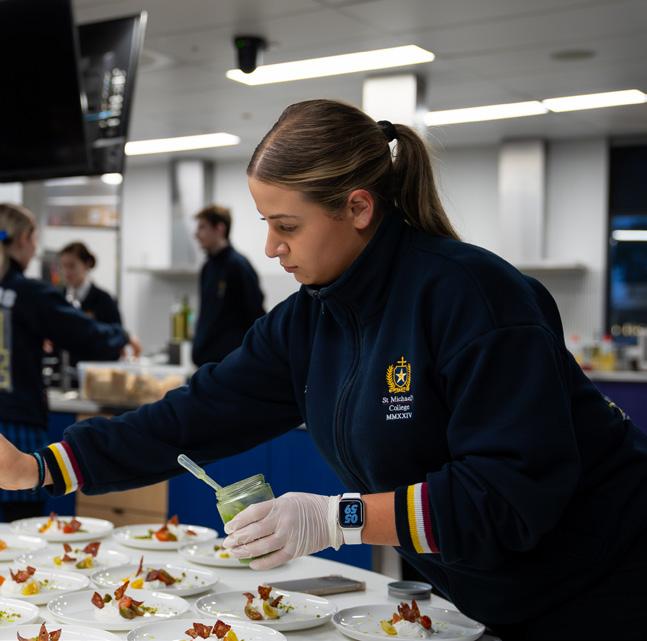
You’ll be finished classes in Term 4 Week 2 and facing exams before you know it, so try not to waste much time this year.
• To master your time is to control your life and what you do with it.
• Effective study requires making the best of all possible alternatives and then doing everything to the best of your abilities in the given time.
• Successfully completing an assignment does not depend primarily upon your skills, but upon the time you make available and how wisely it is used.
Time management is essential for students who want to achieve their goals. If you want to become an achiever with your studies, you need to:
• Record the things you do with your time in order to monitor what improvements can be made.
• Manage your time carefully as it is a limited resource – once it is gone it cannot be reclaimed.
Always maintain a sensible balance in the use of your time. Exam preparation is only one aspect of your life this year – don’t forget your family, your friends and doing all the other things that are important to you right now. One way to ensure you get the most from each day is to follow the steps below:
1. On the night before, make a list of the things you want to do. Number them in order of priority.
2. During the next day, tackle one thing at a time according to the priority listing until each task is completed.
The above steps can be used when planning goals for a day, a week, a month, a year, or a life-time. They can be applied to such activities as your personal life, running a business, achieving sporting or recreational goals, or preparing for an examination.
When planning, always start with a goal and ask such questions as:
• What do I want to achieve?
• How much time have I got?
• What resources do I have?
• How much effort is required?
• Who will help me achieve my goals?
• How will I know if I have succeeded?
In preparing for examinations you basically have to identify what you need to know, and work out how much time you have to learn it.
At the beginning of your study time, read through your class notes for the day. As you do so:
a. Ask yourself what these notes are mainly about.
b. Consider where the notes fit in with what has gone before in this topic.
c. Highlight any special points, quotes or formulae that have appeared for the first time.
d. Mark any parts you do not understand. Make a note of the difficulty. At the next opportunity, ask your teacher to clarify what you do not understand.
e. Make time to read ahead to find out what comes next. It is often helpful to do this on the weekend.
f. File your notes so they can easily be found when it comes to making exam summaries at a later date.
It is very easy to waste time if you are not careful. An important skill to acquire is the efficient use of your time. The effective use of your time will make learning easier for you. The key to the efficient use of study time is planning. If you are not used to planning your study times, you may find it difficult to change your habits and become more organised. Also it is important to know the total hours you spend each week at study and homework. For a start, it is essential that you keep a balance between the two activities.
The best time to study and complete homework varies greatly from person to person. As much as possible, try to study at the same time each day. Being consistent and having regular study times will help you settle down to study quickly, and consequently less time will be wasted.
It is natural that there are probably subjects that you either like more or find easier to study than others. It is only human to be tempted to spend most of your time working on these favourite subjects. However, learning more and more about one subject at the expense of
others is a very poor study strategy. A much better strategy is to always start by studying the hardest subjects, or the ones you like the least.
Sometimes you will complete more hours at homework than study, especially at the start of the year. Then as the exams approach, you will put more time into study activities.
Late submission of work is generally not accepted for assessment purposes and each instance will be investigated accordingly. The student may be at risk of forfeiting all marks allocated to the task, in accordance with SACE guidelines.
If there are any queries about this information, you are invited to contact Mr Kitschke, Mr Anderson or the Director of Curriculum & Assessment (Mr Gavin O’Reilly) for further information.
Teachers aim to ensure that an excessive number of assessment items do not fall due on the same date. Generally, they also aim to return marked material as soon as possible.
Should concerns arise regarding these or any other areas of assessment, please pass them on to your Pastoral Teacher, Mr Labrosciano, Mr Matthew Anderson or the Director of Curriculum & Assessment.
In order to maximise your results and ensure you continue to allow some time for rest and relaxation, the creation of a study timetable is recommended. This will occur during pastoral time in Term 1.
For an up to date Written Examination Timetable, visit www.sace.sa.edu.au
A student who suffers a set-back throughout the course of the year due to disability, illness or personal circumstances, may be eligible for Special Provisions.
These ‘set-backs’ fall into two broad groups: those that occur during the year and affect the school assessed component of their course and those which affect the student’s final exam performance.
Any set-back of a short-term nature, such as chicken pox or a broken arm, is handled internally by the school. Variations to the school assessment can be negotiated with individual teachers and require the normal supporting documentation. Where there is a long-term disability such as dyslexia or physical disability which requires special arrangements for the final exam the SACE Board must be notified at the beginning of the year. Finally, where a student falls ill or subject to circumstances which are likely to affect their exam performance either on the day or within a three day period, they may apply to the SACE Board for use of the Moderated Prexdicted Exam Mark in place of their exam score. Wherever possible, the student is encouraged to sit for the exam in case they actually perform above the predicted mark. In this case, the higher score stands.
Please note that the SACE Board no longer makes allowances for students where English is a second language.
Should you have any questions about the above matters, please contact the Director of Curriculum & Assessment or Mr Anderson, SACE Coordinator.
An assumption is made that much homework and thought went into your subject selections. Given the goal of our Year 12 cohort is to achieve their SACE, the following points clarify the minimum requirements:
Every subject or course successfully completed earns credits towards the SACE. Students will achieve a grade between A+ to E- for each of their SACE subjects. Note: ‘Subject Completion’ at Stage 2 means achieving a grade of E- or better whilst Successful Completion at Stage 2 means achieving a grade of C- or better.
To be awarded the SACE, students completing Stage 2 must:
• Complete 200 Credits of subjects
• Achieve a C or better in the Personal Learning Plan (PLP) – Year 10, 20 Credits of Literacy (English) at Stage 1, 10 Credits of Numeracy (Maths) at Stage 1, and the Research Project at Stage 2, all of which are compulsory subjects.
• Achieve a C Grade or better in an additional 60 Credits at Stage 2, which equates to 3 full year subjects
Expectations for student behaviour during examinations will be issued prior to the examination periods addressing issues such as punctuality and general approach to exams. It is also important that you understand that at examination times, as at all others, expectations surrounding personal presentation and grooming are to be maintained. This means that students sitting examinations must be cleanly shaved and neatly presented in their correct uniform. Grooming standards, including neat and appropriate hair, as per the College requirements. Facial piercings are not permissible and restrictions surrounding the wearing of jewellery and makeup must also be respected.
In line with SACE Examination protocols, mobile phones or other electronic devices must not be taken into the examination room.
Moderation is a process used by the SACE Board to make assessments in a particular subject comparable, and thus fair, for all students, no matter which school or class they are in. The SACE Board uses a range of processes to ensure that all the students taking a given subject are assessed using the same standards. If you would like to know more details about moderation, contact the SACE Board for a student fact sheet. (www.sace.sa.edu.au).
Scaling is a process that compares and adjusts initial results – called ‘raw scores’ – across subjects at Stage 2. Tertiary entrance points are calculated for each subject using the scaling process. These points are produced for tertiary entrance purposes only, and contribute towards the university aggregate and the TAFE SA selection score. The university aggregate is translated into the Australian Tertiary Admissions Ranking (ATAR).
• There is no guarantee that a subject will be ‘scaled up’ or ‘scaled down’ in a particular year. The level of scaling can alter from year to year but in general it does not change much from year to year.
• Scaling of a subject depends upon the performance of groups of students taking that subject in a particular year, not the performance of an individual student.
• The combination of subjects taken by a student does not affect the tertiary entrance points received by that student. All students in SA with the same raw score are scaled the same amount.
For more details about scaling, visit the SACE Board website (www.sace.sa.edu.au).
University Entrance requires qualifying for the SACE, obtaining an ATAR and meeting any Pre requisite subject requirements for the course/ program.
To obtain a University Aggregate and an ATAR you must qualify for the SACE, comply with rules regarding Precluded Combinations, comply with rules regarding Counting Restrictions and complete at least 80 credits of study at Stage 2 of which 60 credits of study must be 20 credit Tertiary Admission Subjects (TAS) from a maximum of 3 attempts (which need not be in consecutive years) Students MUST refer to the St Michael’s Curriculum Handbook and the SATAC Tertiary Entrance Booklet to check the validity of their unique subject choices.
Students who are aiming for University Entrance should be fully aware about which Stage 2 subjects can earn you Bonus Points towards your University Aggregate. To calculate your ATAR please refer to the resources previously mentioned.
University Entrance requires qualifying for the SACE, obtaining an ATAR and meeting any Pre requisite subject requirements for the course/program.
To obtain a University Aggregate and an ATAR you must qualify for the SACE, comply with rules regarding Precluded Combinations, comply with rules regarding Counting Restrictions and complete at least 80 credits of study at Stage 2 of which 60 credits of study must be 20 credit Tertiary Admission Subjects (TAS) from a maximum of 3 attempts (which need not be in consecutive years) Students MUST refer to the St Michael’s Curriculum Handbook and the SATAC Tertiary Entrance Booklet to check the validity of their unique subject choices.
Students who are aiming for University Entrance should be fully aware about which Stage 2 subjects can earn you Bonus Points towards your University Aggregate. To calculate your ATAR please refer to the resources previously mentioned.
Each course at TAFE has a Minimum Entry Requirement. For many TAFE courses above Certificate Level 3 the Minimum Entry requirement is qualification for the SACE, and obtaining a TAFESA Selection Score or satisfactory performance in the TABS Test. Note Some courses may require other specific Minimum Entry Requirements such as Audition/ Portfolio.
If a course is deemed to be “Competitive” then SATAC will decide on offers to the course based on a TAFESA Score. For School Leavers this score is based on 60 credits (i.e. Scaled Score) from the best 3 TAS Subjects (comply with rules regarding Precluded Combinations); for all applicants, this can also be based on the score achieved in the basic TABS Test (a Multiple Choice test based on Year 10 Numeracy and Literacy). The third way to obtain a TAFESA Score is based on the score calculated from a completed Higher Education qualification, not relevant for most school leavers. There are Bonus Point Subjects recognised at TAFE and these vary by course. Students should check the TAFE website to see which preferred subjects earn Bonus Points to their course of interest.
In August of this year, each student will be asked to consider courses that they may wish to pursue at tertiary level.
SATAC nominations will be completed by students who wish to be enrolled at the Universities, and students who wish to enrol in courses at TAFE.
Early investigation into preferred careers and courses will take some of the anxiety out of this process later in the year.
Pastoral Time will be set aside in Term 3 to examine the SATAC process.
Please see the Career Counsellors in Student Services to clarify ATAR course cut-offs of University courses of possible interest.
We bring to your attention that TAFE will offer mid-year entry to many of their courses. To be eligible for midyear entry you will need to apply to SATAC in April and sit for a TABS Test. Those of you contemplating leaving school during the year this may be timely information.
We remind you to see a Careers Counsellor early in Term 1 to support you in your goal setting and Career planning.
Should Year 12s fail to comply with the College’s expectations, then detentions will be issued, or early dismissal privilege will be withdrawn for a set period of time. This will usually include discussion of the problem with Mr Kitschke and possibly a social service component, depending on the nature of the breach.
Year 12s are the role models for the College and as such are expected to meet very high standards.
It is important that all students and parents be made aware of the SACE assessment requirements that are applied at St Michael’s College. These measures are outlined so as to assist the College community to understand and adhere to the policies and practices as they are outlined in the SACE Handbook.
At the beginning of each semester, an assessment plan for each subject will be published in the SEQTA Learning Portal which will cover the entirety of the assessment period. The assessment plan will include the approximate date of assessment tasks together with the weighting applied to that task. This plan helps you monitor the work to be completed. Marks for assessment tasks will also be published for students and parents.
Where drafts are specified for assignments and essays, they must be submitted to the teacher for approval by the due date. Even when drafts are not formally required, they should be standard procedure and retained should verification of your work be required. Drafting is recommended as one means of ensuring optimal results.
When work is being submitted, it may be done so in two ways:
a. Directly to the subject teacher concerned, or
b. Through the Library.
In the case of work submitted to the Library, Stage 2 students may submit work before 4.00 pm on or before the due date. The Library will stamp their submission to verify the date and time.
A general principle to remember is that the onus to substantiate work, or submission of work, lies with the student!
Should absence from school or extenuating circumstances occur prior to the date of submission, an Extension to Assignment form must be obtained from the Subject Teacher and a negotiated date agreed upon for the lodgement of the work. In principle, the period of extension will be in due proportion to the period of absence.
Should a student be absent on the due date of an assignment being due, a note verifying the absence by a doctor or parent must accompany the assignment being submitted upon return. Absences on such dates for minor illness or circumstance leading to work not being submitted on time is not acceptable.
A due date is a due date.
